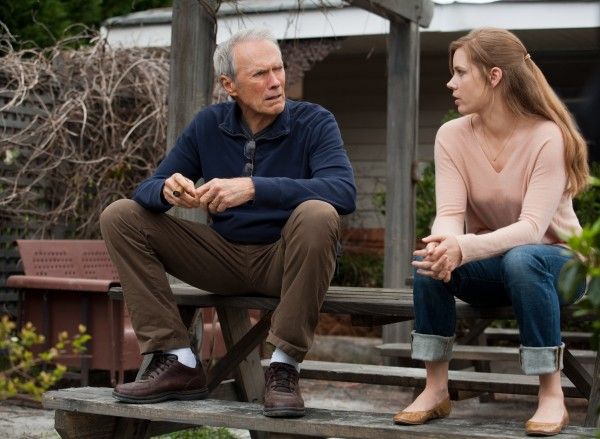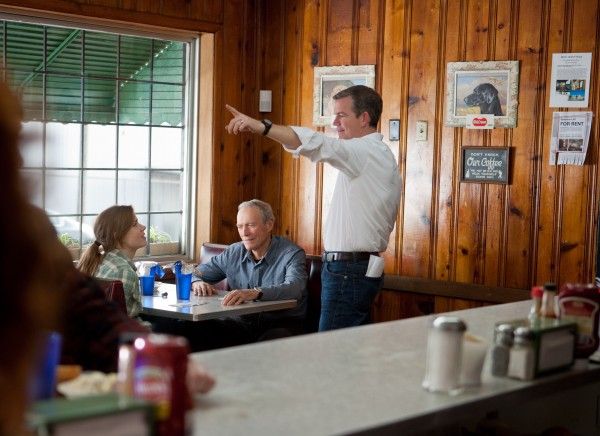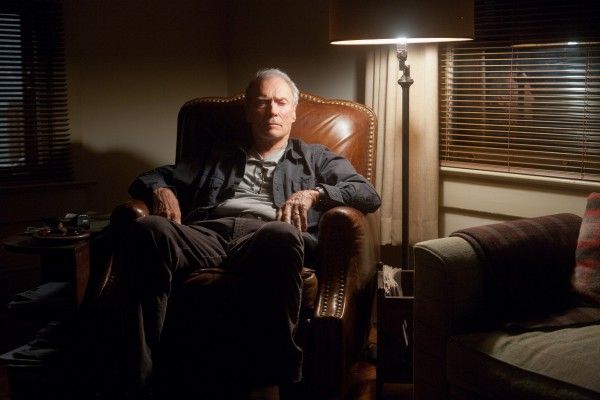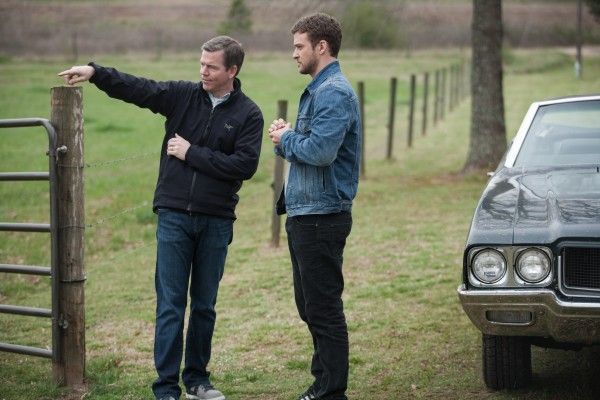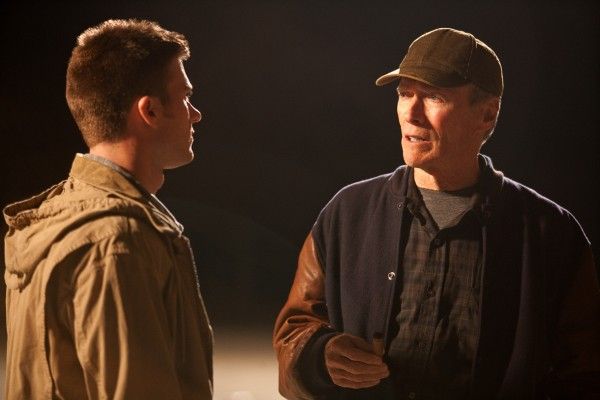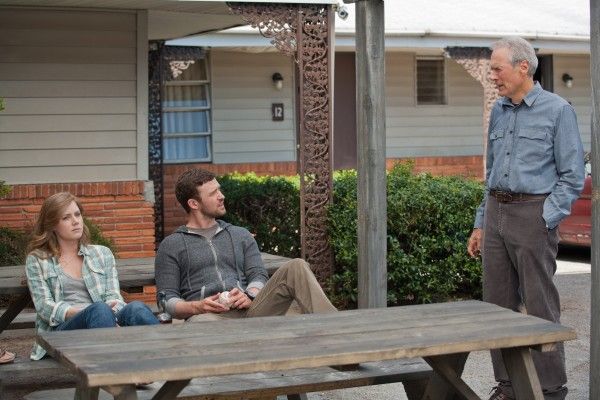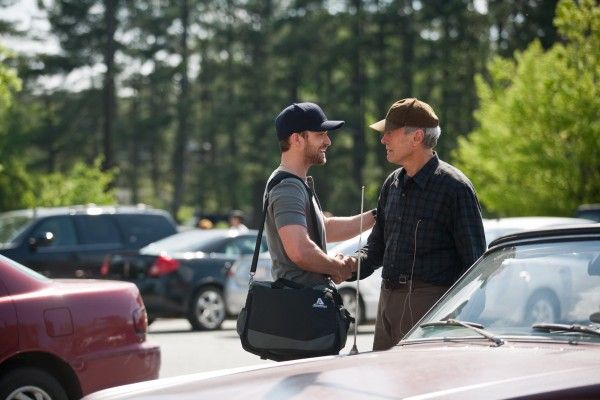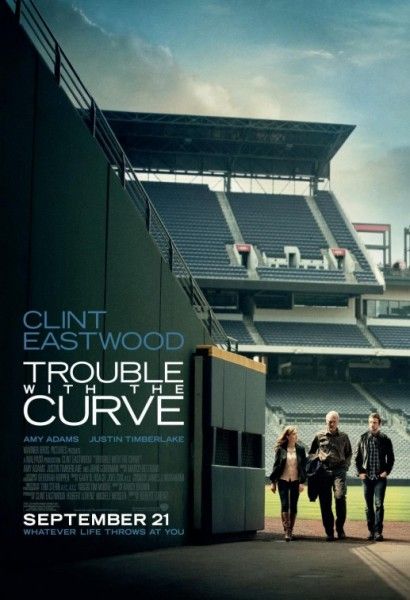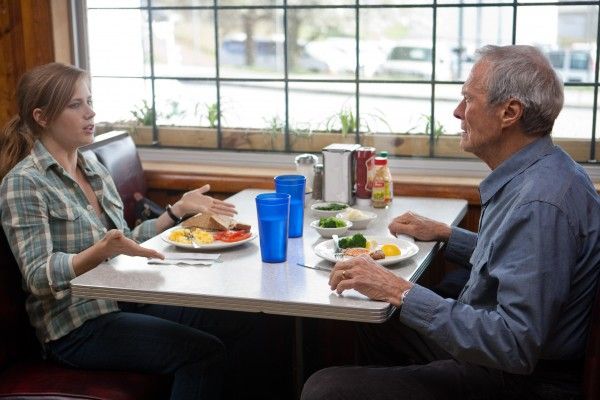Trouble with the Curve is one of those classic Hollywood movies that will make you laugh, cry and warm your heart. The drama tells the story of Gus Lobel (Clint Eastwood), one of the best scouts in baseball for decades, but whose age is finally catching up with him. With an associate director of scouting (Matthew Lillard) chomping at the bit to replace him, in favor of computer predictions of players, his daughter Mickey (Amy Adams) joins him on his latest scouting trip, in order to help him save his career, but quickly realizes that they may never be able to mend their strained relationship.
At a press conference to promote the film’s September 21st release, Clint Eastwood (who is also one of the producers), Amy Adams and Justin Timberlake (who plays rival scout Johnny Flanagan) talked about the pros and cons of aging, working with Eastwood’s longtime producing partner Robert Lorenz on his directorial debut, what they learned about baseball scouts, the interesting triangle that connects their characters, and their impressions of each other. Eastwood also talked about the reaction to his recent speech at the Republican National Convention and the status of A Star is Born, while Adams talked about what it was like to be a part of The Master, and Timberlake revealed the perks of golfing with the film icon and said that he’d like to return to music again, at some point. Check out what they had to say after the jump.
Collider: Mr. Eastwood, what is your relationship with aging, and what do you see as the pros and cons?
CLINT EASTWOOD: Am I aging? The pros and the cons? Well, you know a lot more, at least until the time you start forgetting it all. Actually, aging can be a fun process, to some degree. But, ask me a year or so from now, and I’ll try to give you the same answer.
What do you do to stay in shape?
EASTWOOD: I exercise a lot. I play golf with Mr. Timberlake. That’s what we did during our spare time [when we were filming].
AMY ADAMS: He eats very well, too, from my recollection. He eats very healthfully. A lot of salmon and broccoli.
EASTWOOD: Yes, that’s right.
Amy, you have two incredibly contrasting roles opening right now, with Trouble with the Curve and The Master. What was it like to do those roles?
ADAMS: I shot them a year apart. I was glad I didn’t have to go back-to-back, or shoot them at the same time. That would have gotten difficult. But, I always enjoy accepting challenging and playing roles that are different. [Trouble with the Curve] was a lot of fun, playing a contemporary character who was someone that I could have been friends with and who has a lot of the same issues that I have. That was really a great challenge because I felt really exposed and vulnerable, playing someone who was so similar to myself, but at the same time, it was a great opportunity to explore a father and daughter relationship. You don’t see that a lot in films, so I was happy to do that. [The Master] was a totally different, surreal process that was completely and absolutely different from this. I had to lose myself in a character to which any similarities I had were not similarities that I wanted to bring out of myself. To lose myself in a character like that, it doesn’t feel as good, at the end of the day. Let’s just put it that way.
Mr. Eastwood, what was it like to have Robert Lorenz go from your producing partner to your director? How did your working relationship change?
EASTWOOD: Well, it’s gotten horrible. I had to listen to everything he said. Actually, he did a terrific job, I thought. Rob was making noises about wanting to direct, for some years now. When this property came along, it was one that I wanted to do. After Gran Torino, I thought, “This is stupid, to be doing both jobs. I’ve only been doing it for 40-some years. Maybe I should just do one or the other and allow myself a little bit of a comfort zone. So, this was an opportunity for that, and he stepped right in and took over. I didn’t have to do anything except watch Amy [Adams] throw the ball.
After so many years of being your own director, what adjustments did you have to make to communicate your performance to another director?
EASTWOOD: I had to make no adjustments, at all. I’ve always maintained that there’s more than one way of doing things. A lot of people come up with ideas and, maybe out of a dozen of them, three or four of them are really great. So, I just put it in my mind that somebody else has got to pilot the ship. That’s all. And it’s actually quite relaxing because I can just sit back. When everyone else was working, I was practicing putting. It was a great, relaxing thing, and I probably won’t do both again, at least for the moment. But, I said I wasn’t going to act again, a few years ago, and that changed, too. Sometimes you just lie a lot.
What’s going on with A Star is Born?
EASTWOOD: A Star is Born is a project we’re going to do, down the line. It’s not imminent, right now. It’s six months away, sort of.
Amy, your character is very skilled at a lot of things, between baseball, playing pool and a little bit of gymnastics. How much of that is movie magic and how much of that are you really good at?
ADAMS: I’m really good at gymnastics, and that’s about it. I worked with a baseball coach on this, which was very empowering for me because I’ve never been a girl that was very good at catching a ball or hitting a ball, or anything like that. And I come from a family of jocks, so for me, it was really exciting to work with somebody who actually taught me that skill. I’ve always been really comfortable around athletics, I’ve just never been comfortable playing anything. So, to get to be on the side where you actually can at least pretend to have skill, it was empowering.
JUSTIN TIMBERLAKE: And she’s an extremely good clogger.
ADAMS: That’s true!
Justin, have you ever had any aspirations to be in broadcasting, like your character?
TIMBERLAKE: No.
Mr. Eastwood, what’s kept you passionate about your career, over the years? What gets you excited to go to work with new generations of talent, year after year?
EASTWOOD: Acting gets into your blood, after so many years, and I just always like revisiting it. It’s fun to meet new people and watch them coming along, at different stages of their careers. It’s fun to work with a girl who knows how to throw a baseball. The great thing about Amy is that she is really athletic and she can run. She doesn’t run with her hands floating out, and she winds up and throws the ball, so she’s obviously got a little bit of tomboy attitude, somewhere in her life, and it pays off in this role. Otherwise, you’d have to do it by some trickery, and have a double come in and throw the ball, and then cut to a close-up.
What did you learn about baseball scouts, from doing this?
EASTWOOD: These guys are amazing guys. They spend 300 days a year in hotels. Because they’re going to invest in a kid who’s maybe 17 or 18 years old, and they’re going to offer him a tremendous amount of money to go with their team, they have to really vet them, all the way down the line. They have to go to the neighborhood, stay in the neighborhood, talk to the neighbors, talk to the parents, and find out what the kid is really made out of. A lot of them have been burned, and they told us some amazing stories about being burned, where they had guys that they thought were terrific, and then, as soon as they got out of school and they were given multi-millions of dollars to join up with these teams, they suddenly go off and start drinking and run off with somebody else’s high school sweetheart. So, you just never know. They take a big risk, and if you make too many mistakes, you’re out of a job.
Was it fun to go through the things that this film addresses, or was it sometimes scary to explore some of these issues?
EASTWOOD: You get to a certain age and you’re just glad to be there. I don’t know what to add to that. It’s fun. You have to be a realist, so you try to look for roles that are within the age you are. It would be ridiculous if I said, “Well, I want to play this 35-year-old guy.” They’d have to get a sandblasting machine out and get to work. It’s great. You have to be realistic about where you are in life and enjoy it. I’ve enjoyed the journey to this stage, so I intend to enjoy the rest of the journey. A long one, I hope.
Justin, what attracted you to this role and what did you learn from the experience?
TIMBERLAKE: Well, I guess I specifically saw Johnny as the only character in the movie that was actually being honest about everything. You have a character like Gus, who’s going through the trials of aging and not wanting to be helped, and then you have a character like Amy’s character, who has probably filled her life up with work. So, there’s this thing under the chest of trying to fill in something that’s missing. What I thought was great about this character is that, through his humor, hopefully, he became this bridge or thread between the two of them. I actually saw him as a really good guy, which I don’t think I’ve gotten to play yet. So, there was a lot of acting involved. No. The triangle that is Clint’s character, Amy’s character and my character is interesting. You have a daughter who’s longing for a relationship with her father, and who watches this guy come in that she’s never even met or heard of, have a better father-son relationship with her dad than she has a father-daughter relationship. The more you get to know Johnny, the more he is the only person in the movie who is being completely honest about his situation. Through that, maybe he’s the olive branch between the two of them. I thought that was an interesting dynamic.
Is there still singing, in your future?
TIMBERLAKE: Like when cars are flying, in the future? I hope so! Not anytime soon, but hopefully, yes. I would like to continue to do that.
Amy and Justin, you guys have such great chemistry in the film. Had you known each other, prior to this? What were your first impressions of each other?
TIMBERLAKE: Well, it was really uncomfortable for me ‘cause I had to beat [Amy] off with a stick.
ADAMS: Oh, yeah! It’s true! We met out at events and stuff, but I wouldn’t say I knew Justin until we worked together. My first impression of Justin, on set, was that he came in with a ton of energy and a lot of ideas. He just has an amazing work ethic, so he really surpassed any expectations I might have had of him, just as an individual. I have a lot of respect for work ethic, and Justin has got an amazing work ethic. There was an ease about working with him. I can tend to be very serious, and it was great to get to have that kind of banter. It felt very natural.
TIMBERLAKE: Well, I like to under-promise. No. We had a really great time working together. It’s interesting because Amy is elite, in this craft. We can start there. She talked about playing someone that’s close to her, but I really think she’s so amazing at finding so much of herself in every character that she embodies. It just so happened that this character happened to be a lot more serious. In talking to Rob, after I read the script, I had a lot of ideas on what kind of humor we could work on together, to inject into Johnny, and the fact that his character becomes what makes him so attractive to her. I don’t mean the character in the movie, but his actual character. But, he really antagonizes her and I felt like, if there was a way to do that and keep it grounded, at the same time, it would make for a nice connection between the two of them. At the end of the day, I think that her character does see that he is being honest. We all have issues with our parents, growing up. It becomes a thing, as adults, where we either break that chain or it continues to be the thing that holds us back from maybe our relationships with friends or significant others. But, there was an underlying consistency to Johnny that helped break that chain. And it was just fun to antagonize Amy, as well.
Justin, what did it mean to you professionally to work with Mr. Eastwood, and what did it mean to you personally to golf with him?
TIMBERLAKE: I don’t know that there’s a descriptive. If you would have told me, a year before, that I was going to get to sit at a bar and drink scotch and trade lines with Mr. Eastwood, I would have laughed at you. And then, I would have probably cried because I would have felt like I’d never get that opportunity. There really just isn’t a descriptive, to be honest with you. And then, I got to watch what Clint does on set. Making this movie was the most familial experience I’ve ever had, even playing a supporting role. With the nature of shooting, there are days where you’re in and out, but there was such a constant good feeling, anytime we were on set, making the movie. My favorite part about working with Clint is that the days are really short. Also, I like that he likes to work fast. Being the producer on this movie, I feel like we carried that with us. It makes you prepare even harder and try to be more aware and listen better, in the first two takes because those might be the only ones you’re going to get. But then, I had the experience of playing golf with him. If you roll with Clint, you can get on Augusta with no problem. You’re hanging out with the coolest guy in the world. We just had a lot of fun. But, to more answer the question, the whole process was very familial. For a film like this, that in my opinion is really about a new family, and what’s good and bad about that, watching him lead by example and to see someone who’s had such an iconic career, but who continues to be so excited to be there, is so supportive of everyone else, and so collaborative, that’s why the movie is great. It’s him leading by that example.
Mr. Eastwood, did you know that your appearance at the Republican National Convention would get the response it did, and how do you feel about it, in retrospect?
EASTWOOD: Well, it didn’t get the response that I wanted because I was hoping they’d nominate me. My ambitions were tremendous. But, I don’t know what the response was. My only message was that I just wanted people to take the idolizing factor out of every contestant out there, and just look at the work and look at the background, and then make a judgment on that. I was just trying to say that, and I did it in kind of a roundabout way, which took a lot more time, I suppose, than they would have liked.
If you could do it over, would you give that speech differently?
EASTWOOD: Probably. I’d probably say something else, but I’d try to get the same message across that people don’t have to kiss up to politicians, no matter what party they’re in. You should just evaluate the work and make your judgments accordingly. That’s the way you do it in life and every other subject, but sometimes in America, we get ga-ga and we look at the wrong values. I don’t know if I’d do it the same. I doubt it ‘cause I thought of that about five seconds before we started. When you walk out there and you have an audience of 10,000 people that are extremely enthusiastic, your mind goes blank, anyway. So, I’d probably say something else.
Trouble with the Curve opens in theaters on September 21st.


